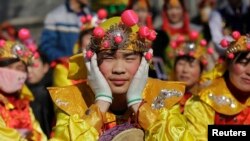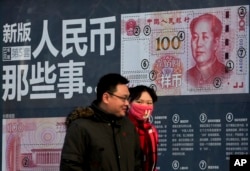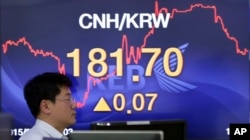China is up against a tricky situation on the financial front in Year of the Monkey, facing the need to fight capital flight while also stopping a further slide of foreign currency reserves.
The year began with a sharp reduction in its foreign currency reserves, an important bulwark of country’s economic strength. Foreign reserves fell $99.5 billion in January as the government sold vast amounts of dollar to buy Yuan (RMB) and keep it from falling further. The Yuan has reached a 5-year low raising concern about a drastic devaluation, and greater pressure on the slowing economy in China.
Analysts say more battles to shield the Yuan are expected, resulting in further erosions of reserves.
“I would expect reserves to continue to fall this year, likely under $2.5 [trillion],” Scott Kennedy, deputy director, Freeman Chair in China Studies, at the Washington based Center for Strategic & International Studies (CSIS), told VOA.
Capital outflows
Another reason for the slide in reserves, which shrunk by $513 billion in 2015, is capital flight caused by wealthy Chinese looking for safer heavens for their savings abroad. The expected rise in interest rates in the United States will make it more attractive for them to transfer money out of China, observers said.
“Pressure on the RMB is completely, entirely, 100% driven by domestic investor capital flight from China. There is not one shred of empirical evidence that this is driven by international investors,” said Christopher Balding Associate Professor at HSBC School of Business at the Shenzhen campus of Peking University, in his blog.
It’s a double-edged sword. Capital flight is putting pressure on the Renminbi (RMB), or Yuan, forcing the government to spend more money to keep it stable.
“With its foreign exchange reserves shrinking at such a rapid pace, China will not be able to keep supporting the renminbi for much longer,” Sandra Heep, head of program, Economic Policy and Financial System at the Berlin based Mercator Institute for China Studies, said.
She added China is finding out the hard way that it is impossible to combine an autonomous monetary policy with a managed exchange rate and a relatively open capital account.
Balancing act
Heep expects Beijing to drastically tighten capital controls to avoid a financial crisis because it is unlikely to take the riskier route of allowing the Yuan to float freely at a time when the economy is going through a slowdown.
But some economists warn of the dangers of imposing very tight capital controls. They point out a slowing economy requires the government to relax capital flows, and encourage higher funding for productive sectors.
“China will not tighten liquidity because it is not only worried about capital flight, it is also worried about keeping up growth. And it is using fiscal and monetary stimulus to support growth,” Scott Kennedy said.
He described the anti-corruption campaign as “the biggest drag” on the country’s economic growth. “I don’t expect economic stimulus to have much stimulating effect as long as the anticorruption campaign remains the leadership’s top priority,” he said.
Some of the other reasons for decline in China’s foreign reserves is the government’s move to pay off foreign debts early, selling U.S. treasuries and growth in the country’s outward foreign investment, Kennedy pointed out.
“I do expect continued reductions in China’s overall foreign exchange holdings in the coming months, but the Chinese government has reinserted informal and formal capital controls to ensure that there is not a mass exodus out of the RMB,” said Kennedy.
International investors and world governments are closely watching how Communist leaders would deal with the falling reserves.
As the reserves slid in January, George Magnus, economic commentator and associate at Oxford University's China Centre, wrote on Twitter: "China's fx reserves fell another $100bn... clearly this can't go on for long."






